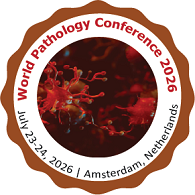Sessions
Diagnostic Histopathology & Tissue Analysis
This track explores advanced histopathological techniques that enhance diagnostic accuracy across a wide spectrum of diseases. It highlights innovations in tissue processing, staining methods, and quantitative measurement systems. Researchers will discuss novel biomarkers and morphological predictors of disease progression. Emphasis is placed on integrating digital microscopy and automated analysis tools. Case studies demonstrating improved diagnostic workflows are showcased. The track encourages cross-disciplinary interaction to strengthen histopathology standards.
Molecular Pathology & Genomic Medicine
Focusing on the molecular mechanisms behind disease development, this track examines genomic, epigenomic, and transcriptomic markers. Attendees will gain insights into personalized medicine approaches driven by high-throughput sequencing. Discussions include the translation of genomic data into clinical decisions. Emerging molecular diagnostic platforms will be analyzed for clinical feasibility. Ethical considerations in precision medicine are also addressed. The track fosters collaboration between geneticists and clinical pathologists.
Digital Pathology & Artificial Intelligence
This track covers the technological shift toward digital scanning, automated image interpretation, and AI-assisted diagnostics. It examines machine-learning algorithms capable of detecting subtle morphological variations. Presentations highlight workflow transformation in laboratories adopting digital pathology. Challenges such as data storage, interoperability, and regulatory standards will be discussed. Real-world outcomes from AI-powered decision support systems are evaluated. Experts will also debate future prospects for autonomous diagnostic solutions.
Clinical Pathology & Laboratory Medicine
Clinical biochemistry, hematology, and microbiology form the core of this track. Participants will explore how laboratory tests guide therapeutic decision-making and improve patient outcomes. Innovations in point-of-care testing and automation will be spotlighted. Case-based discussions illustrate quality assurance strategies and error reduction. Regulatory frameworks governing laboratory practice are reviewed. The track promotes a strengthened link between clinicians and laboratory scientists.
Hematopathology & Blood Disorders
This track focuses on diagnostic advancements in leukemias, lymphomas, and other hematologic malignancies. Presentations will highlight modern immunophenotyping, cytogenetic analysis, and molecular classifiers. Special attention is given to minimal residual disease monitoring and therapeutic response evaluation. Experts share updates on evolving classification systems and treatment-related pathology. Participants can explore rare blood disorders and their diagnostic pitfalls. The track fosters improved clinical-pathological correlation.
Neuropathology & Neurodegenerative Disorders
Delegates will examine pathological mechanisms underlying Alzheimer’s, Parkinson’s, ALS, and rare neurological diseases. Discussions include advances in brain tissue imaging, molecular diagnostics, and biomarker development. Presenters will demonstrate how neuropathology informs therapeutic trials. Cases illustrating infectious, autoimmune, and traumatic neuropathology are included. Emerging insights into neuroinflammation and synaptic pathology will be shared. The track promotes multidisciplinary knowledge exchange across neurology, pathology, and neuroscience.
Cancer Pathology & Tumor Biology
This track covers solid tumor classification, tumor microenvironments, and mechanisms of metastasis. Experts discuss state-of-the-art immunohistochemistry and molecular profiling techniques. Presentations include updates on WHO tumor classification revisions. Attendees will explore prognostic and predictive biomarkers guiding targeted therapies. Case reviews highlight challenges in diagnosing rare malignancies. The track emphasizes translational research bridging pathology and oncology.
Immunopathology & Immune-Mediated Diseases
Immune dysregulation contributes to a wide array of diseases, and this track focuses on their pathological signatures. Sessions explore autoimmunity, hypersensitivity reactions, transplant pathology, and immune-checkpoint responses. Advances in flow cytometry and immunohistochemical markers will be highlighted. Researchers will discuss immune evasion mechanisms in cancer and chronic infections. Practical issues in diagnosing overlapping immune disorders are presented. The track encourages collaboration between immunologists and pathologists.
Infectious Disease Pathology & Emerging Pathogens
This track examines the pathology of viral, bacterial, parasitic, and fungal diseases, including newly emerging global threats. Sessions highlight advancements in PCR diagnostics, metagenomics, and pathogen surveillance. Participants will analyze case studies from recent outbreaks. Discussions include host-pathogen interactions and tissue responses. The track emphasizes preparedness for future pandemics. Experts review novel antimicrobial resistance patterns and diagnostic challenges.
Cytopathology & Liquid Biopsy Techniques
Focused on cell-based diagnostics, this track covers fine-needle aspiration cytology, exfoliative cytology, and rapid on-site evaluation. Presenters discuss technological improvements in liquid biopsy, including circulating tumor cells and cell-free DNA. The track highlights challenges in differentiating benign from malignant cellular changes. Advances in cytomorphology linked with molecular tools will be showcased. Case discussions reveal the impact of cytopathology in early cancer detection. Attendees gain insights into quality standards and reporting guidelines.
Pediatric Pathology & Developmental Disorders
This track addresses pathology in neonates, infants, and children, emphasizing congenital anomalies, metabolic disorders, and pediatric tumors. Experts will share advances in genetic testing and metabolic profiling. Discussions include unique diagnostic challenges due to developmental variations. Case studies illustrate evolving trends in pediatric malignancies. The track promotes early detection strategies to reduce long-term morbidity. Multidisciplinary collaboration is strongly emphasized.
Cardiovascular Pathology & Vascular Diseases
Sessions explore structural and molecular alterations underlying heart disease, stroke, and vascular disorders. Attendees will examine updates in atherosclerosis research, myocardial injury biomarkers, and thrombosis mechanisms. Presenters highlight cardiac autopsy findings and their clinical value. Representatives from both cardiology and pathology share insights on sudden cardiac deaths. Case reviews illustrate the impact of comorbidities on cardiovascular pathology. The track encourages integrative clinical-pathological interpretation.
Pulmonary Pathology & Respiratory Disorders
This track covers diseases of the lungs and thoracic cavity, including interstitial lung diseases, COPD, asthma, and thoracic tumors. Presentations highlight pulmonary fibrosis mechanisms and biomarker-based classifications. Advances in imaging-pathology correlation are explored. Experts will discuss insights from infectious pulmonary diseases like tuberculosis. Case-based analysis of rare thoracic neoplasms will be included. The track integrates research, diagnostics, and therapeutic perspective.
Gastrointestinal & Hepatobiliary Pathology
Delegates will examine pathological changes across the esophagus, stomach, intestines, liver, and pancreas. Discussions include updates in colorectal cancer biology and inflammatory bowel disease. Sessions highlight the diagnostic complexities of hepatic fibrosis and steatohepatitis. Molecular markers aiding early detection of GI malignancies are explored. Presenters will share experiences with minimally invasive tissue sampling. The track bridges endoscopy, surgery, and pathology.
Renal Pathology & Kidney Disorders
This track focuses on glomerular, tubular, interstitial, and vascular kidney diseases. Presentations highlight the role of immunofluorescence and electron microscopy in diagnosis. Case studies cover diabetic nephropathy, autoimmune nephritis, and transplant rejection. Emerging biomarkers for renal injury will be discussed. Molecular profiling approaches in kidney pathology are emphasized. The track strengthens coordination between nephrologists and renal pathologists.
Dermatopathology & Skin Disease Mechanisms
Attendees will explore benign and malignant skin conditions, inflammatory dermatoses, and infectious skin diseases. Advances in dermatopathologic pattern recognition will be highlighted. Speakers discuss molecular and genetic insights behind skin tumors. Diagnostic challenges posed by overlapping skin disorders will be addressed. Interactive slide sessions enhance practical learning. The track emphasizes integration with clinical dermatology.
Endocrine Pathology & Metabolic Disorders
This track delves into thyroid, adrenal, pituitary, and pancreatic endocrine diseases. Molecular signatures in endocrine tumors will be discussed extensively. Case studies include diabetes-related pathology and metabolic syndrome complications. Insights into hormonal imbalance mechanisms and diagnostic biomarkers are shared. Advances in targeted therapies for endocrine cancers are presented. The track promotes interdisciplinary collaboration between endocrinology and pathology.
Reproductive Pathology & Women’s Health
Sessions explore gynecologic cancers, placental pathology, and infertility-related disorders. Experts discuss ovarian tumor classification updates and endometrial pathology. Molecular diagnostics in cervical neoplasia will be spotlighted. Presentations also examine pregnancy-related complications and perinatal pathology. Case studies demonstrate diagnostic nuances in reproductive tissues. The track strengthens collaboration between pathologists and gynecologists.
Genitourinary Pathology & Male Reproductive Health
This track examines prostate cancer, testicular tumors, kidney tumors, and urinary tract disorders. Presenters highlight molecular markers refining GU tumor classification. Case discussions reveal diagnostic challenges in bladder carcinoma and renal masses. Advances in biopsy interpretation and imaging correlation will be reviewed. Pediatric and adolescent GU pathology topics are included. The track encourages integration of clinical and pathologic perspectives.
Oral & Maxillofacial Pathology
Attendees will explore oral cancers, salivary gland disorders, odontogenic tumors, and inflammatory conditions. Sessions highlight diagnostic advancements using molecular tools. Presenters discuss the significance of early oral cancer detection and screening. Imaging-pathology correlations will be emphasized for jaw lesions. Case-based presentations reveal complexities in differentiating look-alike lesions. The track promotes collaboration with dental and surgical specialists.
Forensic Pathology & Medicolegal Investigations
This track covers autopsy techniques, trauma analysis, and medico-legal documentation. Sessions include updates on forensic imaging, toxicology, and cause-of-death assessment. Experts discuss challenges in interpreting suspicious deaths. Presenters will highlight the integration of molecular tools in forensic investigations. High-profile case studies offer real-world insights into legal implications. The track serves as a bridge between pathology and law enforcement.
Veterinary Pathology & Comparative Medicine
This track examines pathological processes across animal species, offering insights that translate into human medicine. Presentations include updates on zoonotic diseases and comparative oncology. Sessions highlight molecular techniques applied in veterinary diagnostics. Case studies showcase emerging pathogens in wildlife and domestic animals. Experts discuss shared disease mechanisms across species. The track strengthens the One Health approach.
Pathology Education, Training & Skill Development
This track focuses on modern pedagogical approaches in pathology teaching and resident training. Sessions highlight simulation-based training, digital slide sets, and competency assessment strategies. Presenters discuss curriculum modernization and effective skill-building tools. Challenges in global pathology education access will be examined. Innovative assessment models and mentorship programs will be showcased. The track aims to elevate global pathology education standards.
Laboratory Quality Management & Accreditation
Delegates will explore international standards for laboratory quality, accreditation programs, and regulatory compliance. Presentations include best practices for workflow optimization and error reduction. Experts discuss laboratory automation, internal audits, and external quality assurance schemes. Case examples show how accreditation impacts patient care. Innovations in quality informatics will be highlighted. The track promotes continual improvement and global harmonization.
Pathology Informatics & Data Science
This track emphasizes the management, integration, and analysis of pathology data using informatics tools. Presentations explore laboratory information systems, interoperability challenges, and secure digital ecosystems. Experts highlight how big data and cloud platforms enhance diagnostic workflows. Case studies illustrate predictive analytics and clinical decision support. Discussions include cybersecurity and data governance. The track fosters a data-driven future for pathology.
Translational Pathology & Biomarker Discovery
Bridging basic science and clinical application, this track focuses on pathways linking laboratory discoveries to patient care. Speakers will highlight biomarker validation, therapeutic target identification, and drug response prediction. Case studies demonstrate collaborative research models. This track emphasizes multidisciplinary team science involving clinicians, biologists, and pharmaceutical experts. Regulatory considerations for biomarker approval are reviewed. Attendees gain insights into accelerating the bench-to-bedside pipeline.









